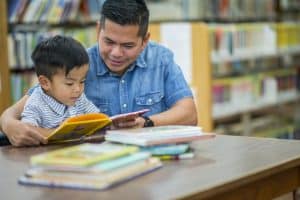When you read together with your child, there are moments when they suddenly grasp a new skill and smile with joy. Just then you may wonder, “What is going on inside their mind when they learn?” Researchers in neuroscience and education have been asking that same question for decades! All of their research comes together to form the science of reading . But what exactly is it?
The science of reading is all of the neuroscience and education research that “helps us understand how the brain learns to read and how to deliver instruction that helps students learn to read most effectively.”[1] Using that research, teachers are guided to the best strategies that line up with what happens in the brains of young learners. This allows them to focus on teaching skills that help the brain form new pathways that lead to literacy.
Waterford, a leading educational nonprofit working in early literacy for over 40 years, follows six instructional strands for literacy learning that align with the findings of the National Reading panel. These strands are:
- Phonological awareness
- Phonics
- Reading fluency
- Reading comprehension and vocabulary
- Language concepts
- Communication
The more you know about how your child learns, the better you can help them achieve their best at home and at school. Read on to discover the inside scoop on what’s happening inside the young reader’s mind and discover fun and easy activities to boost your child’s learning each day.
The Science of Reading: Six Important Areas of Learning
Phonological awareness
Phonological awareness is the ability to hear the sounds of spoken language. To read words, your child will need to connect the sounds of language with the letters that represent those sounds. This means that the ability to hear the sounds of language is an essential skill for learning to read.
 Phonological awareness skills include rhyming. For fun rhyming practice , take turns saying words that rhyme. How many can your child think of? Some of them might be silly words (cat, rat, hat, sat, zat, gat…)! Or, say a group of words and ask your child to name the one that does not rhyme with the others (cat, hat, rat, dog). You could also sing rhyming songs together and find the rhyming words. For example, “Twinkle, twinkle little star . How I wonder what you are !” You can even make up your own rhyming songs!
Phonological awareness skills include rhyming. For fun rhyming practice , take turns saying words that rhyme. How many can your child think of? Some of them might be silly words (cat, rat, hat, sat, zat, gat…)! Or, say a group of words and ask your child to name the one that does not rhyme with the others (cat, hat, rat, dog). You could also sing rhyming songs together and find the rhyming words. For example, “Twinkle, twinkle little star . How I wonder what you are !” You can even make up your own rhyming songs!
Phonics
Phonics skills help your child connect letters and letter sounds so they can begin to sound out words. One way you can practice phonics skills is by doing a Letter Sound Hunt. Choose a letter and sound you would like to practice with your child and see how many words you can think of together that begin with that letter and make that sound. For example, you could say, “S says /s/. Can you see some things that begin with /s/? Sink, sandwich, sofa!”
Activities that teach phonics skills include:
- Uppercase and lowercase letter cards
- ABC songs
- Spelling pattern games
Reading fluency
When children read accurately, with expression, and at an appropriate pace, they are considered fluent readers . Reading to your child is the best way to show them how it’s done, and you can start modeling fluent reading for your child very early in life. You can also watch narrated book videos together for more examples of fluent reading.
Here are a few books to download and narrated videos to get you started:
- Pat Can Camp by Cynthia Belnap (available in Spanish: Pat puede acampar , translated by Daisy Bratcher)
- Mine by Elizabeth Lane (available in Spanish: Mío , translated by Daisy Bratcher)
- The Three Little Pigs
- Lizard and the Painted Rock
- The Little Red Hen
Comprehension and vocabulary
Reading comprehension , or understanding what is read, makes reading a tool for lifelong learning. Help your child explore new words, new ideas, and new subjects. The more they know, the more they can learn, because vocabulary and background knowledge are the building blocks of reading comprehension!
To help your little one practice reading comprehension, pick out interesting books on different subjects from your local library. This will introduce them to new words and concepts. As you enjoy books together, be sure to discuss what you are learning and what you are wondering about before, during, and after reading.
Plus, for tons of free downloadable books in English and Spanish on a variety of reading, math, and science topics, create a Waterford Mentor account . If your child is interested in stars and planets, try Defying Gravity: The Story of Mae Jemison to learn new words and ideas about astronauts and outer space (available in Spanish here: Desafiando la gravedad: La historia de Mae Jemison ).
Language concepts
Language concept skills help your child understand how written language is organized. This begins early with “print concepts,” including the knowledge that we read English from left to right and from top to bottom. Later, children learn about sentence structure, grammar, and much more!
Putting together foldable books can be a good way to introduce print concepts to children. Here are a few to get you started:
- Opposites (available in Spanish: Opuestos )
- Hair (available in Spanish: Pelo )
- Pat-a-Cake (available in Spanish: Palmitas )
Communication
Communication skills teach children how to express themselves and listen to others through spoken and written language. Communication includes speaking, listening, reading, and writing.
Your child probably asks a lot of questions. Talk about what your child is interested in, and ask them some questions right back! Practice communication skills by taking turns speaking and listening in conversation.
Journaling can be helpful for learning communication skills. Children can practice writing while recording their thoughts and ideas. Use these 52 journaling prompts , one for each week of the year, to try it with your child. And remember–young children may “write” their ideas by drawing, scribbling, or writing random letters that they know. These are the first steps! Ask your child to explain what their writing says, and celebrate their efforts.
Waterford Aligns with the Science of Reading
Waterford’s learning content is based on the science of reading. Our digital learning pathway adapts to your child’s current skill level and needs to build literacy, so they can enjoy the thrill of learning instead of feeling frustrated.
Families of PreK-aged children can use the early learning program Waterford Upstart to learn reading skills at home that will help them start school strong. It is offered at no cost to families and registrations for upcoming programs are always open.
Follow this link to learn more about Waterford Upstart and apply for a program in your area.
Sources:
- Christensen, J., Persch, K., & Esser, L. An Overview of the Science of Reading. Video from Waterford.org. Nov. 2021.


